Rapporti ISTISAN 09/49 ISTITUTO SUPERIORE DI SANITÀ Ageing ...
Rapporti ISTISAN 09/49 ISTITUTO SUPERIORE DI SANITÀ Ageing ...
Rapporti ISTISAN 09/49 ISTITUTO SUPERIORE DI SANITÀ Ageing ...
Create successful ePaper yourself
Turn your PDF publications into a flip-book with our unique Google optimized e-Paper software.
<strong>Rapporti</strong> <strong>ISTISAN</strong> <strong>09</strong>/<strong>49</strong><br />
hypertension, diabetes and diseases related to age which can be prevented and are curable),<br />
tertiary ageing (derivative processes which occur during the months preceding death).<br />
2.15. Healthy behaviours<br />
Our health, wellbeing and life expectancy may be influenced by adjustment to our lifestyle.<br />
The factors we can correct directly are diet, exercise, smoking, alcohol intake and the degree to<br />
which we expose ourselves to pollutants. Sleep, fluid intake, and excessive stress affect our rate<br />
of ageing. There is a well-known list of life events which are related to stress. High on the list<br />
are the deaths of a partner or child, loss or change of a job, financial crises and major illness.<br />
Longevity relates to a sense of purpose and meaning in life, commitment within a<br />
community and a quality of independent mindedness. In many respects the present cohort of 50<br />
and 60 year olds represent a pioneer group. They grew up in the post war years when there was<br />
a new spirit of freedom and they have retained a determination to find purpose in the later years<br />
of their life. They represent a significantly large section of the community and are, therefore,<br />
increasingly influential in economic terms (Perring, 20<strong>09</strong>).<br />
Many gerontologists agree that high levels of physical, cognitive, and social functioning are<br />
related to health and successful ageing. A large body of research and theoretical literature<br />
confirms that physical, cognitive, and social functioning, broadly speaking, are key factors of<br />
successful ageing and that multiple lifestyles choices, behaviours, and psychological factors<br />
influence them. Empirical studies have shown that many age-associated declines in physical and<br />
cognitive functioning can be explained in terms of lifestyle factors such as smoking, physical<br />
activity, and nutrition (Franklin & Tate, 20<strong>09</strong>).<br />
Older adults, who abstain from smoking, engage in physical activity and sustain quality<br />
dietary habits, may improve their health span and quality of life. In this sense, the predictors of<br />
successful ageing are in many ways under personal control (Franklin & Tate, 20<strong>09</strong>).<br />
The identification of risk and protection is certainly one of the most relevant objectives of<br />
health psychology. In mass media, sometimes even in scientific literature, the extent of risk is<br />
presented in a way which, even if fundamentally correct, seems to be extremely misleading. A<br />
certain way of presenting data, in order to modify people’s habits, transforms itself not in an<br />
information action, but in a message which terrorises and destabilises. It is the case of antismoking<br />
campaign (Thompson, 1978; Leventhal & Cleary, 1980; Maburn, 1982) where<br />
exposition to terrorising messages rather than leading to a change of one’s behaviour, produces<br />
the negation of it and a kind of desensibilisation which people carry out in order to avoid the<br />
anguish caused by messages. A realistic evaluation of risks would seem to better allow the<br />
individual to emotionally integrate the message and activate a process of change of his<br />
behaviour. A careful analysis of the question underlines the importance of biological risk<br />
factors, but above all their simultaneous presence with other factors and their interaction in each<br />
individual. Many researches show that the adoption of certain habits and lifestyles by people are<br />
linked to attitudes and beliefs people have about health. The impact that events like losses,<br />
divorces or diseases have on the individual does not only depend on the kind of such events and<br />
the physiological processes which are activated, but also on the ability of the individual to cope<br />
with that specific situation. Such ability of facing situations is strongly influenced by the<br />
interpretation the individual has carried out of the event and by the degree of social support<br />
which he receives from his reference context (family, friends, peer groups) (Zani & Cicognani,<br />
2000). On the other hand to define what healthy behaviours or behaviours dangerous for health<br />
are is not easy.<br />
22



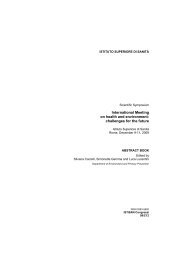
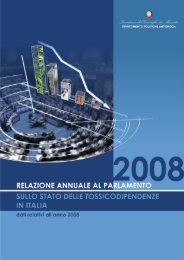
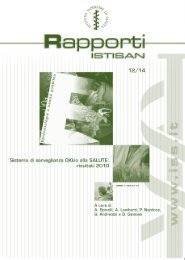
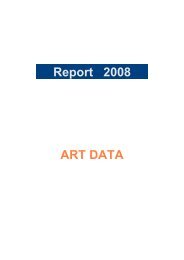
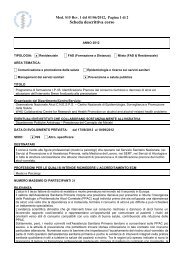
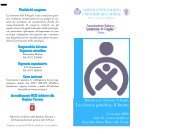
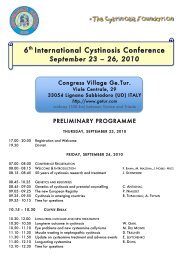
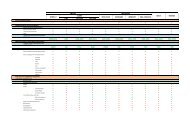
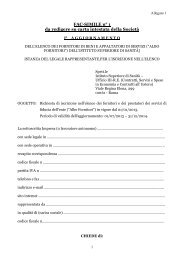
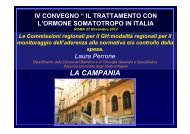
![Emilia Romagna [PDF - 175.10 kbytes]](https://img.yumpu.com/23556597/1/184x260/emilia-romagna-pdf-17510-kbytes.jpg?quality=85)



![Istisan Congressi N. 66 (Pag. 1 - 81). [PDF - 2021.12 kbytes] - Istituto ...](https://img.yumpu.com/23556493/1/171x260/istisan-congressi-n-66-pag-1-81-pdf-202112-kbytes-istituto-.jpg?quality=85)